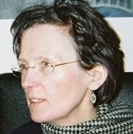
Diane Proudfoot
Diane Proudfoot is Associate Professor of Philosophy at the University of Canterbury, New Zealand. We invited her to answer the question “What is Philosophy of Religion?” as part of our “Philosophers of Religion on Philosophy of Religion” series.
Defining philosophy of religion is an impossible task. Philosophy of religion is, to quote Ludwig Wittgenstein’s view of language, like ‘an ancient city: a maze of little streets and squares, of old and new houses, and of houses with additions from various periods; and this surrounded by a multitude of new boroughs’. The ancient quarters include Theravada Buddhism’s account of karma and Tertullian’s elevation of revelation over reason; and the medieval districts include Al-Ghazali on the happiness of faith and Moses Maimonides on the coercion of unbelievers. The new boroughs include Wittgenstein’s own comparison of the believer to ‘a tightrope walker’. Some older streets have fallen out of fashion in favour of new neighbourhoods such as feminist and comparative philosophy of religion. Current inhabitants of the city employ a variety of modern tools, for example hermeneutics and symbolic logic. They appeal to diverse source materials, for example ethnographic studies or linguistic analyses of scripture. They also have diverse aims, for example answering the ‘big’ questions (e.g. ‘Did God create life?’) or mapping similarities between religions in order to promote inter-faith dialogue. The locals include ‘folk’ philosophers (anyone talking about the ‘supernatural’ over coffee or the water-cooler), religious professionals (e.g. clerics practising authorized theology), and academic scholars. Some endorse a particular religion or religious world-view, while others reject the very idea of the supernatural. Definition is not possible: there are no (necessary and sufficient) conditions that define the activity—past, present, and future—of this dynamic city.
Continue reading →


